|
1 Comment
Those who follow us at Back to La Tierra may possibly think that our current life at is so blissful it’s unreal, naive and maybe even self centred. All the social injustice and environmental disasters that go on all over the world whilst we are trodding around like Alice in wonderland worrying about earth worms, eating our home made and home grown vegetable soup.
I’ll let you in on a secret. We know it all. I for one, Paul is struggling, have chosen to live in cultivated ignorance. I simply can not digest the amount of upsetting news that we are bombarded with every second of the day in all shapes and forms. I find it paralyzing and depressing. It scares the hell out of me and leaves me in a state of absolute desperation. The more sensitive you become to bliss, beauty and kindness the less you are able and willing to deal with the dark side of the world. I find philosopy gives me insight and answers when I walk into these kind of walls and specifically the Stoics. One of Marcus Aurelius’s meditations talks about the pleasure of tuning out the negative How satisfying is it to dismiss and block out any upsetting or foreign impression and immediately to have peace in all things. Part of the Stoic mindset was a kind of cultivated ignorance. Contrary to popular belief it’s not a sign of weakness to shut out negativity but they considered it a sign of strong will. We live in an age when this is not a very acceptable life philosophy. One must face reality, confront the truth, open one's eyes and ears. The only problem is that reality and truth in the way that they are served to us are in fact limited to negative realities, highlighting the bad news, feeding our fear and discomfort. I often wonder how this contributes to our daily lives, how it impacts our life decisions. Over this last year I have found that everything that happens in our garden at Back to la Tierra is in fact a metaphor for life in all its facets. This is not a new discovery, biomimicry is gaining a growing recognition. At the moment Paul and our Helpx helper Guillaume are sheet mulching our orchard. This is a process where the soil is covered by cardboard and that is covered by a thick layer of mulch (organic waste). After a few months the cardboard and mulch decompose and have nourished the soil in such a way that life is returned to it. Bacteria, fungi, and all other micro life, most of which has not even been identified, decompose the cardboard and the mulch. Earthworms in the soil improve permeability for water and air. The thick layer makes sure the weeds dont see the light (metaphor intended) and the soil gets time to build itself to nourish that which needs to grow. Building and nourishing the soil will support everything that grows instead of planting a tree in a barren land and treating it with a pesticides. At times we need to sheet mulch our soul too. Cover it in a nice layer of thick protection (rest, read, exercise, create) and let it seep into the deeper layers of our being. Wait to see what grows, what has been waiting to surface. Cultivating ignorance may just turn out to be the recipe for abundant growth. “Ir al campo” (Going to the country) in the weekend to have a paella together is one of those outings that I love about living in Andalucia.
El campo is somewhere inland, far enough to feel disconnected from daily responsibilities, where you improvise with eating and drinking tools and can let go of wanting to colour coordinate the serviettes. It’s also, similar to a BBQ, the occasion where a man takes full charge of the cooking. Well, the paella part, which becomes a very serious project a man does not take lightly. We were at a paella lunch yesterday organised by our friends Arturo and Cristina close to Puente Genil in the Cordoba province. Arturo, he doesn’t mind me saying, is an authentic macho iberico and Cristina, originally German fell for him, head over heels about 25 years ago. Our children played together when we were neighbours at one point and would talk a mixture of English and Spanish as they all went to the International school. Those same children are now in their twenties and all turned into not only beautiful young adults but exemplary European citizens. The fun part about having paella as the excuse to come together is that it is a long process to make and requires continuous stirring and attention. We were about 40 people and although the day started chilly, when the sun came out it was lovely outside. The paella was an enormous pan and one stands around it with a drink and chats. A lot of talk goes into why the person who is holding the spoon is stirring around rather than in straight lines/stirring too little or too much/at what point the broth needs to be added, which rice is the best and why etc. A lot of making fun of the chef too of course, but he will hold onto the spoon as if his life depends on it. This is his paella and no one messes with it. Whilst subjects such as politics and finances are side stepped and dodged with the skill of a bullfighter, Paul and I can always hide behind our passports. We wisely don’t pick sides in conversations about the Cataluña issue, we don’t have to, it’s not our fight. The position of an observer and questioner is so much more interesting anyway and a lot less complicated. As everyone is helping out to set the buffet table with salads, cheese and olives that they brought from home others walk around to serve each other wine. We find ourselves caught up in a magnificent history lesson by a man from Cordoba who claims to be a descendant of one of the oldest families in his town dating back to 1460. Coming from a country where national pride is non existent, it never seizes to surprise me how proud Spaniards are of their country and heritage. The interpretation of the 80 year dominance Spain had over the Netherlands is always a nice opportunity to tease and challenge the ‘facts’. Laughter and general loudness attracted me back to the paella. The paella cook had decorated the top of the paella with slices of hard boiled egg. I had never seen this version and asked if it was typical from the area. “No way! They replied, we have NEVER seen or eaten a paella with hard boiled egg, but his mother always made it this way so he does too!” I found it very endearing that the cook was prepared to be ridiculed like this to defend his mother’s culinary free styling. The sun was starting to set as we drove home and the beautiful winter sky shed a filter over the Cordobese country side shifting our focus away from the sadness of the olive grove monoculture and the dry, infertile soil. All those years of agricultural small scale traditions, if only they had been defended with the same passion as paella cooking. The almost two hour drive home gave us enough time to talk about where we can still find small scale production for oil and wine. We are going to do some research. Hopefully we will have it available for you to try on your next visit to our retreat at Back to La Tierra. We had a meeting with a gallery in Malaga the other day who will represent Paul on a German art fair next year in Karlsruhe.
You never go to Malaga for just one thing. Getting side tracked is its greatest asset. We parked in the parking of Plaza de La Merced which is the best option whilst the road works for the metro are going on in the rest of the centre. From the Plaza you walk straight into the centre either via the Teatro de Cervantes or via the Calle de Acazabilla/ Calle Granada. We had a coffee with Javier Roman around the corner from his gallery by the Cervantes Theater and then went on to Restaurante Vino Mio to study the space that they offered to exhibit some of Paul’s works. Now that we were in Málaga it seemed like a good opportunity to check out the Revello de Toro museum. We saw his works exhibited in Barcelona a long time ago but heard that they were now collected in the restored home and workshop of the 17th century sculptor Pedro de Mena. Revello is known for his portraits of mostly the women in his life and the way he captures the light. Surprisingly we were the only visitors, the entrance fee of only €2,50 makes it really worth the visit even if you are not necessarily interested in art or the artist. The house, hidden in a side street, is beautifully restored with its typical central patio. Walking back to the car a serene feeling came over me with the sound of a distant flute and guitar music. After the noisy city bustle it felt as if we were walking into a historical oasis with the Alcazaba castle and the Roman theater as a backdrop. People talking, listening, reading, just sitting quietly. Such a beautiful scene. Why is it that everything becomes a story when there is music to frame the moment? This city never stops to surprise me, clearly not only me, it has become an extremely popular city break. Malagueños have the duende to carry this popularity with pride without letting the tourists take over. There was a spot free on a sunny corner and we ordered a Málaga Victoria beer. A group of glamorous Malagueñas walked by dressed for a wedding, their heels clicking on the city stones, their hats casting a shadow on their faces in a way only Revello can capture on canvas. Olé! We are offered a lottery ticket by a gypsy woman, who, as they do, throw around poetic compliments to cajole people into buying. I told her we never buy the lottery because being lucky in love automatically rules out our luck in gambling. No señora. Si tienen suerte en el amor es que tienen suerte en todo. (No madam, if you are lucky in love you are lucky with everything) She’s right. We bought the ticket. When we got back to La Tierra we ran into our current guests who just returned from a visit to Monda and were on their way out to Alboka Gastro for a late lunch in Mijas Pueblo. Such a luxury to be close to everything but away from it all. Please be informed that all links have been looked up for your interest and reference and are not affiliate links. “What does your perfect day look like?”
The question startled me because I had never meticulously imagined the perfect day from waking up in the morning to going to sleep at night. Sure, looking back we can often say ‘that was a perfect day!’. Often it wasn’t entirely planned but it somehow worked out beautifully when we look back on it. When I started consciously imagining perfect days it turned out to be so helpful in making all sorts of decisions. After all, if your perfect day involves being outside all the time, an office job will not be giving you the joy you are looking for. If your perfect day is being surrounded by people and physically active you will not be happy as a lab researcher. Work is, for most of us, a large part of our day to day life. A lack of (paid) work will therefore play a large role in it and the psychological difference between paid work and unpaid work is a tricky one. So are guilt and responsibility. We ‘need’ to work to pay the bills after all, we need to contribute to society, we need to be responsible in taking care of our family. We make choices in the strain work has on our private life, our relationships, the price we pay in being (time) away from home and our loved ones. The price we pay by not developing our artistic or musical skills. The price we pay in our health and the continuous stress we feel in our body and mind. The topic fascinated me in such a way that I have researched our human needs and life decisions for years, even wrote a book on it. I looked at it from all the possible angles including (new age) spirituality, psychology, religion and yoga philosophy. Although everything helped shape my vision it wasn’t until I came across the great philosophers that I felt I found true understanding. It turns out that these questions have been around as long as humans have been thinking. Eudaimonia is one of the words that not only has a magical ring to it but also has a deep, true meaning. Aristotles coined the word and it became a moral philosophy “that defines right action as that which leads to the "well-being" of the individual, thus holding "well-being" as having essential value. The term "eudaimonia" is a classical Greek word, commonly translated as "happiness", but perhaps better described as "well-being" or "human flourishing" or "good life". More literally it means "having a good guardian spirit". Eudaimonia as the ultimate goal is an objective, not a subjective, state, and it characterises the well-lived life, irrespective of the emotional state of the person experiencing it”. (See link for more info on the matter.) If we base our life goals on eudaimonia then our mission is to live life in well-being. There is no division between our private life and our working life. Our working life is an extension of who we are. No work-life balance needed, the balance is inherent in our daily choices. If we do the work that is in line with our eudaimonia we don’t have to work another day in our life because we love what we do, it helps us flourish and it never feels like work. That’s “bull shit” my friend said the other day when we talked about this. “It’s bull shit because we need to do stuff and some of it simply sucks”, “no eudaimonia to be found in cleaning the bathrooms and doing tax returns, in dealing with irritating clients, in dealing with death and divorce!”. It startled me a bit, after all I had found the jackpot, I had discovered the manual to a truly happy life and I wasn’t about to give that up. When we imagine our perfect day we may consider doing all day what we now do as a hobby or our passion. It may be painting, writing or gardening. What we don’t realise when we turn that into our ‘work’ is that the guilt and responsibility we have always associated with ‘work’ now end up weighing down the love of our passion because it no longer is just that; a passion. It now has to produce and deliver. It has to be made practical, it has to serve us in a pragmatic sense. We need to comply and adapt to outside requests. It’s weird what happens in our mind when, what we most love, needs to bring home the bacon. Compare it to sending your kids out to work double shifts to pay your rent. My friend retaliated by saying that she discovered she really enjoyed her previous ‘work’ again, after hating it for years. because being good at something gives such satisfaction and actually, she kind of loved that about it. And so do I. I love that by doing what we think we love we find out what we NEED to do. Discover the meaning behind what we want, who we want to be and what we need in this phase of our life. Discover the practical wisdom of our own everyday decisions and discover what we want to liberate. Which part of us will never be weighed down by outside expectations, by money or responsibility. It turns out that that aspect of our lives allows the flourishing of all the rest. Not everything that we do needs to make sense. It’s a bit like writing this article. Whatever you may think when you read it… it’s fine. It’s my passion to spill my philosophical guts, no price attached. What it has become is a way to share ideas and inspiration that will help define the meaning of our contribution to Back to La Tierra. A way to think aloud, start meaningful conversations and discover that we each need to design our own life-manual. No generic model will do the trick. Discover what you need and it will give all aspects of your life the meaning you require. (In October 2018 we will be moving back to our finca in Mijas to create perfect days ... see www.backtolatierra.com) If you have decided to start reading I am assuming it is because the title rang a very loud bell. I am not assuming it is because you had nothing to do, nowhere to scroll, no one to app. Reading, as is cooking, has become a revolutionary act. Writers are off the scale revolutionary for insisting on it in spite of very few people wanting to read and even fewer people wanting to pay for what has been written. As a writer and a reader you can imagine that I am living on a whole new level of self flagellation. I love to read people who have everything seemingly figured out. Clear, simple yet elegant creative living whilst contributing to a regenerative not just sustainable economy. I love it. Yet, I always wonder how they manage to live up to their creativity whilst remaining simple? How they pay their bills regeneratively? Books like Walden websites like Becoming Minimalist, Going Zero Waste The Permaculture student the Story of Stuff Project make it seem so easy. They recommend to just set some guidelines and get on with it. I have problems with both: how do you nuance and prioritise guidelines? How do you ‘get on with it’ amidst a world out of balance? In one article I came across it as a gender thing; Men just aren’t as fussy. In another it suggests to stick to a number of time saving rules that you incorporate in your day that may not always be a regenerative option but will give you time to dedicate to more significant projects. Let's call that the pragmatic approach. According to Henry David Thoreau simplicity is achieved by owning less stuff. After decades of collecting more and more things many people end up paying a monthly fee to rent storage space to save stuff we don’t use or what about all the cubic meters in your house that are occupied by things? Would you get rid of everything and move into a tiny house where you would not need to earn the income to pay for the cubic meters you don't really need? It looks like a lot of our stories are actually about stuff. Marie Kondo has helped many sort through their belongings with the KonMari method. Does the item sparkle joy? Great! you may keep it (in a colour coordinated, alphabetical and chronological orderly fashion of course). However useful it is, however expensive it was, if it gives you no joy, adios amigo. She suggests to pile up everything you own in one place and then pick up each item for the joy test. I think this system was intended for single people living alone because I can only imagine the scenario when the rest of the family would come home after momma’s joy test to find everything gone, or the even more overwhelming one of piles of stuff in every room for ever waiting for the owner's procrastination to pass. Fly Lady suggests setting a 10 minute timer and getting on with storing shoes, throwing out garbage, straightening the pillows on the couch, wiping down the kitchen tops, whatever, for a straight ten minutes non stop. I realise this is a very unsexy household tip but believe me, simplicity begins with a clear head and one can not think amidst chaos. The problem seems to get bigger though, once I can think, which was kind of a disappointment as far as tips go but what can you do. You see, simple living, by my books, means a more basic and natural way of living which immediately rules out industrially produced foods and packaged stuff. Finding your farmers market is fun, being at one is even more fun but the shopping will take you longer than a visit to a supermarket and the cooking longer than 2 minute meals in the microwave. But then I think of Marie Kondo; does it sparkle joy? YES! And equally important, is there anything I would rather do than this? NO! Keep moving. Simplicity? Nobody said it was easy. If you want to follow my wellbeing journey you can do so by clicking the button below.
If there is a budget for scientific research and two projects are presented, one to research the wellbeing of a cow after it is separated from its calve and another where a scientist wants to research the effect a change of diet has on milk production we all know which project will be considered more important and will subsequently be allocated the budget. If the first scientist would want to get another shot at doing the mentioned research he/she would have a better chance if the study was focused on the effect depression has on milk production. In other words, there needs to be a direct correlation between what we as a society have agreed to give a priority and the money we invest in it. Of course we like the idea of happy cows but only if it doesn’t affect our milk price.
A similar situation occurs when you speak to artists. Although we all like the idea of art we are not quite sure who should pick up the tab for all those creative spirits contributing to worldly aesthetics. There are two types of artists; those that sell and those that don’t. This does not always depend on the quality or standard of their art but usually on a combination of entrepreneurial talent and serendipity. Of course your opinion of these two groups largely depends on which group you are in yourself. For most artists money is a tricky subject largely because it does not differentiate worth and value. Something of great value can have little worth and vice versa. If you are not creatively inclined you will expect the artists to take care of themselves. We all need to, after all, be self supporting and take responsibility for our own choices. Selling art is the way for an artist to survive although he tends to have little influence on the price at which his work sells. Besides, once selling becomes a goal, creativity and originality will often need to move to the back seat and the painted word will become a necessary strategy. You need to decide your niche market, you need to build up your artistic authority and attract your fans. Your fans don’t necessarily want to know about you or your art as such, they want to know why your art will be a good investment and you an attractive cash cow. At the Art-preneurial training with Peter Maasdam in Amsterdam it was clear that Tony Robbins was in his outer circle of influence. Storytelling, high energy and high fives turned the down to earth Dutch in an enthusiastic audience. Don’t get me wrong, my admiration goes out to Peter for what he has achieved and for taking this very scary step towards motivational speaker after setting up a successful art-rental business and transforming a depressing Merck pharmaceutical warehouse into an uber cool and arty meeting and inspiration centre, but it just disappointed me that the build up of the programme was so obvious. From the testimonials of previous clients to the discount if you purchase today offer. Needless to say, when you go to a training day to learn how to earn more money with your art, the business model isn’t based on the entrance fee for the day programme. So then, why does it bother me that there is a time share hustle feeling about getting people to buy your training when the day is over? Especially as I am sure that numerous artists in the audience would benefit from his training, Peter is a smart, friendly, energetic guy with experience, curiosity and drive to move people to the next level. After some serious inner questioning I realised that what bothers me is the insight that creatives have still not managed to find a way to play the business game successfully by their own rules. That generic models are adapted to fit selling art with prices based on mm2 and word counts. That we are all struggling to find the formula that allows us to keep our head high, our wallet filled and our hearts on fire. Let’s practice observing all man made beauty around us, how it inspires us to live our life to the fullest and how that subsequently makes us so much more productive…. ! If you prefer, world, we can adapt the wording of the research project to prove it. (Credits to photographer Jocelyn Wu via Unsplash, whose image I may download and use free of charge, the irony of which I am sure will not go unnoticed but for which I am very grateful) Thrive Global is an online community started by Arianna Huffington (the founder of the Huffington Post) with the mission to prioritize wellbeing and commit "to accelerating the culture shift that allows people to reclaim their lives and move from merely surviving to thriving." Needless to say we share the same philosophy and a couple of my articles have been posted on the site. See the article in the link below.
Thrive Global is an online community started by Arianna Huffington (the founder of the Huffington Post) with the mission to prioritize wellbeing and commit "to accelerating the culture shift that allows people to reclaim their lives and move from merely surviving to thriving." Needless to say we share the same philosophy and a couple of my articles have been posted on the site. See the article in the link below.
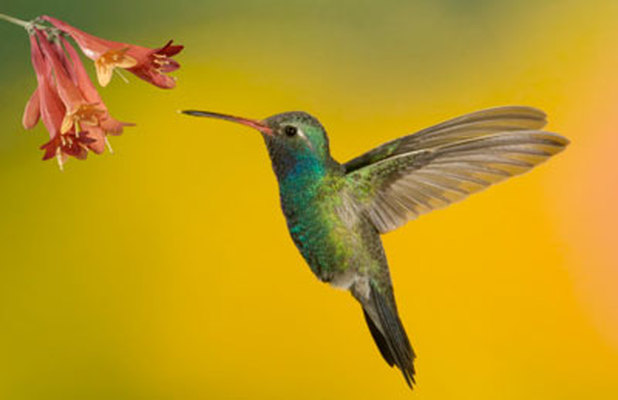 I love aha moments especially because their timing seems to be so magically orchestrated. Like the moment I heard Elizabeth Gilbert talk about passion. I always get a little awkward when surrounded by people who have a concrete goal in life, seem to know exactly how to get there and just go without being side-tracked. We live in a world where determination and rationality are highly respected and admired. Being interested in everything, learning something everywhere and wanting to talk to everyone is then a rather flaky form of existence. Not if you're a hummingbird... You see, Liz Gilbert tells us, "there are two types of people. There are jackhammers & hummingbirds. Jackhammers are focused and efficient. Hummingbirds move from tree to tree, from flower to flower, from field to field. Trying this, trying that. Two things happen, they create incredibly rich and complex lives for themselves and they also end up cross pollinating the world. That is the service that you do if you are a hummingbird person. You bring an idea from here, to here, where you learn something else and then you weave it in to bring it there. Your perspective keeps the entire culture aerated, mixed up and open to the new and fresh. That is the path that you are supposed to lead. Release yourself from the pressure of finding your one passion. Trust it. If you humbly and faithfully follow the hummingbird path, follow your path of curiosity, you might be surprised where you end up. It might be exactly where you want to be, surrounded by the people you want to be with." I watched the hummingbirds when we were in Costa Rica and was mesmerised by their agility, speed and their beauty. Thank you Liz, for clarifying my path. Hummingbirding is my passion. |
Marina is...Inspired by everything that matters and convinced that creative living is on top of the list. Archives
April 2020
Categories |
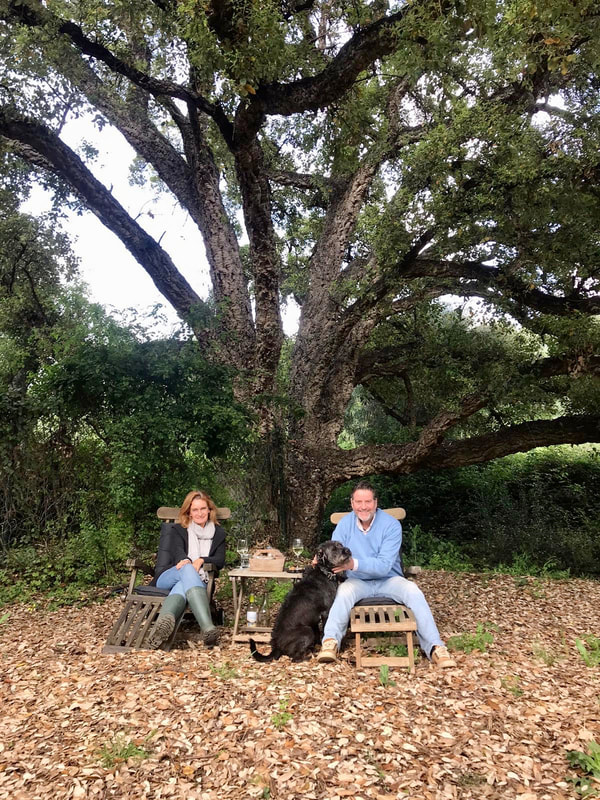
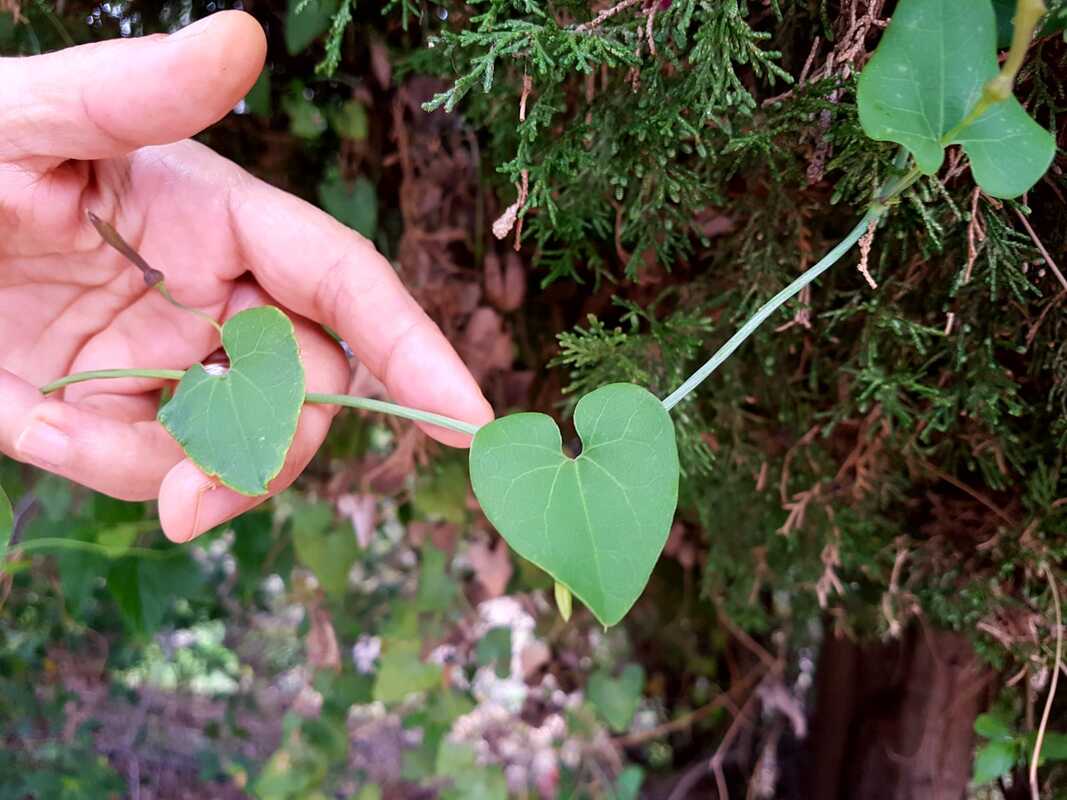
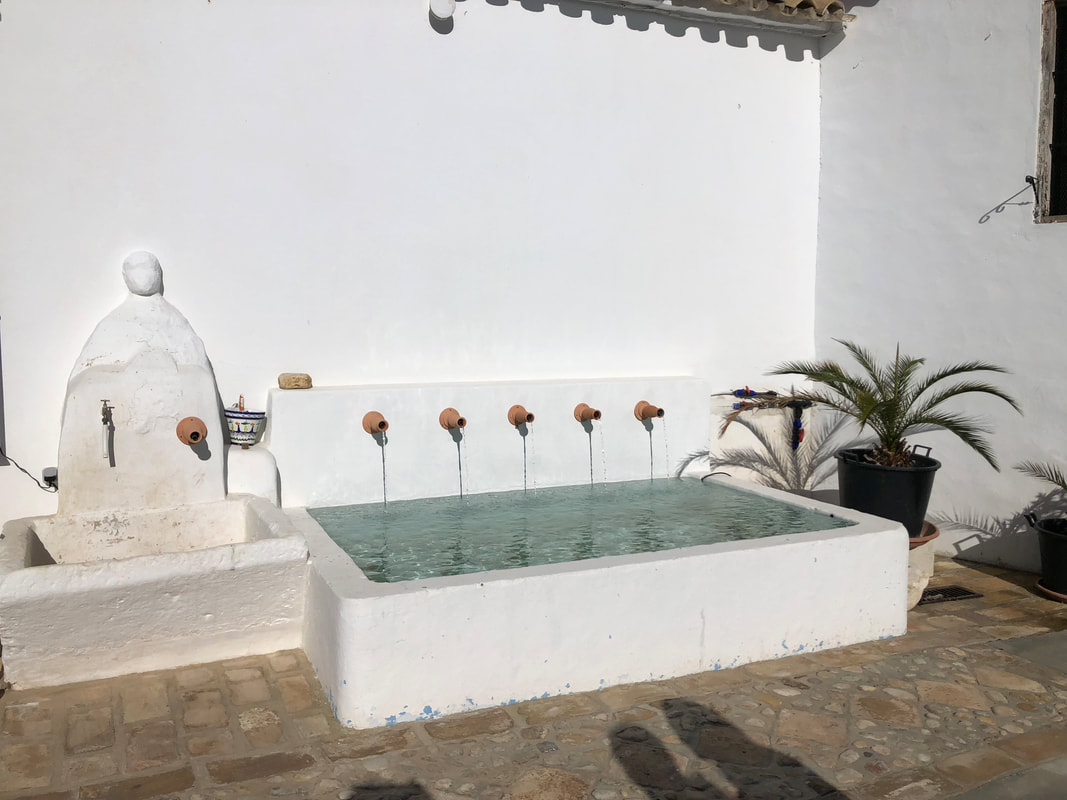
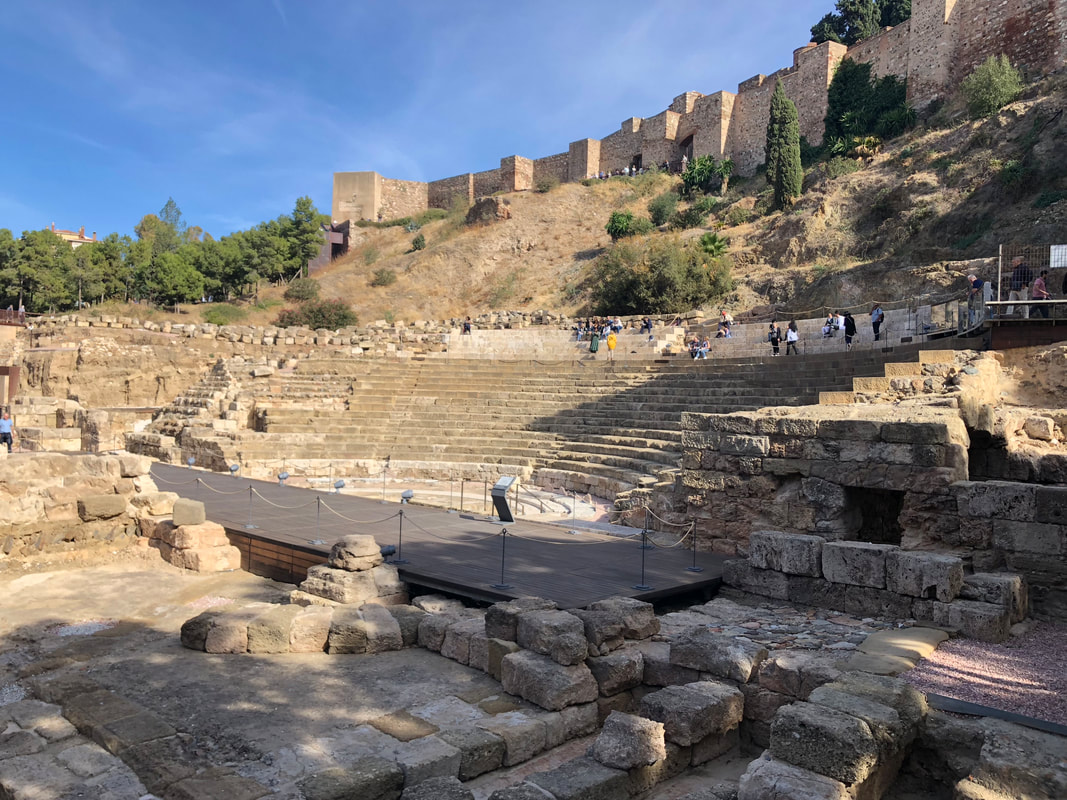
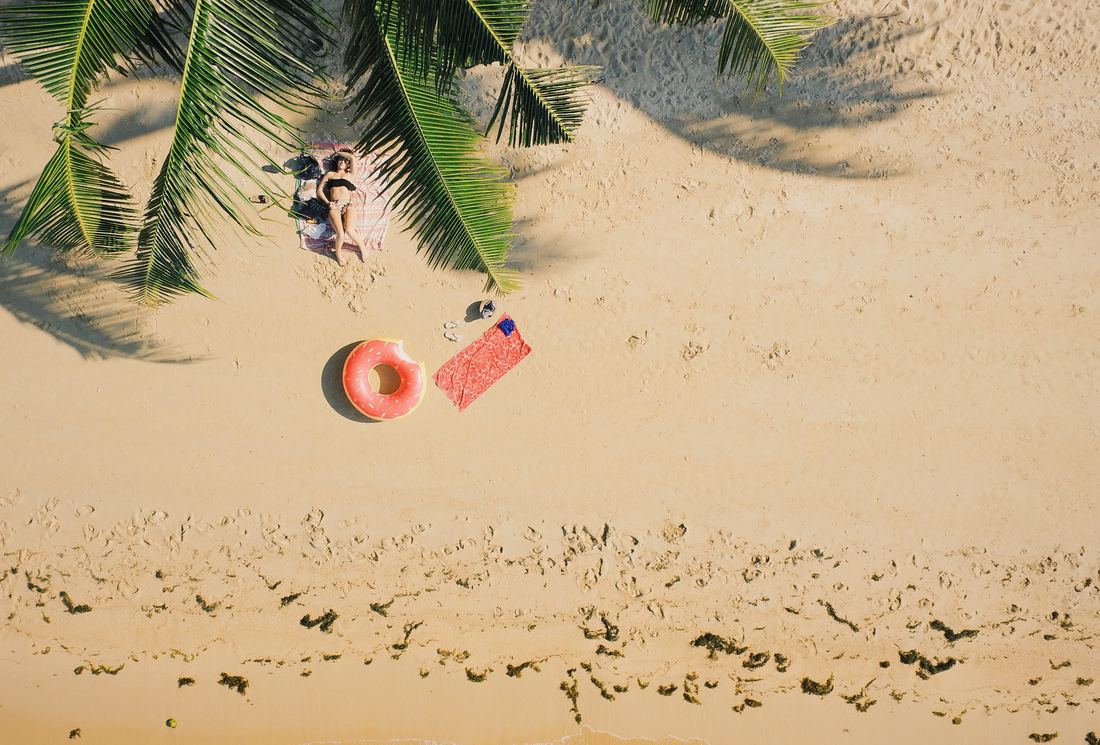
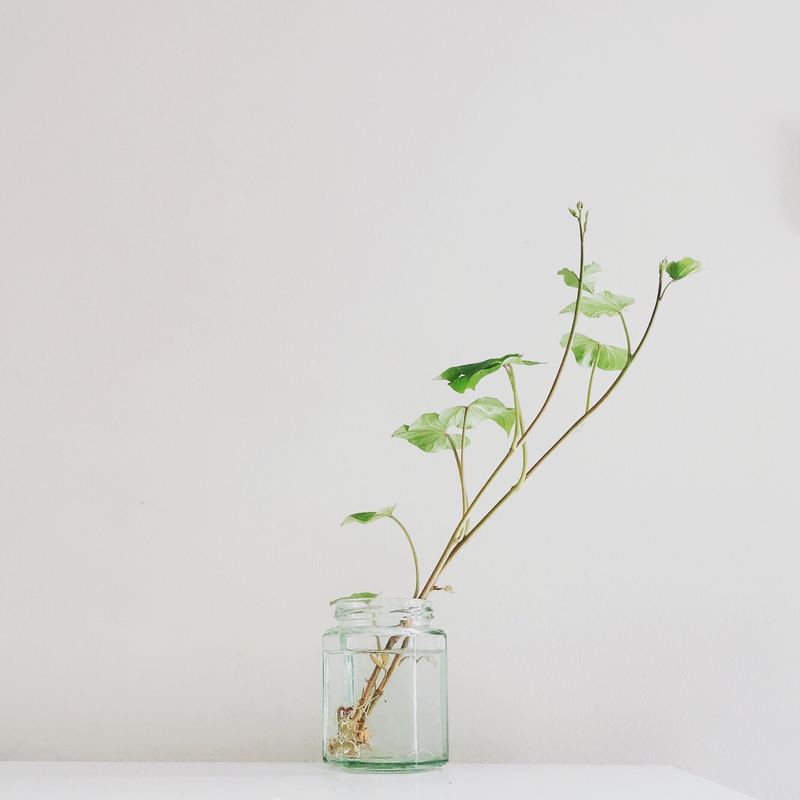
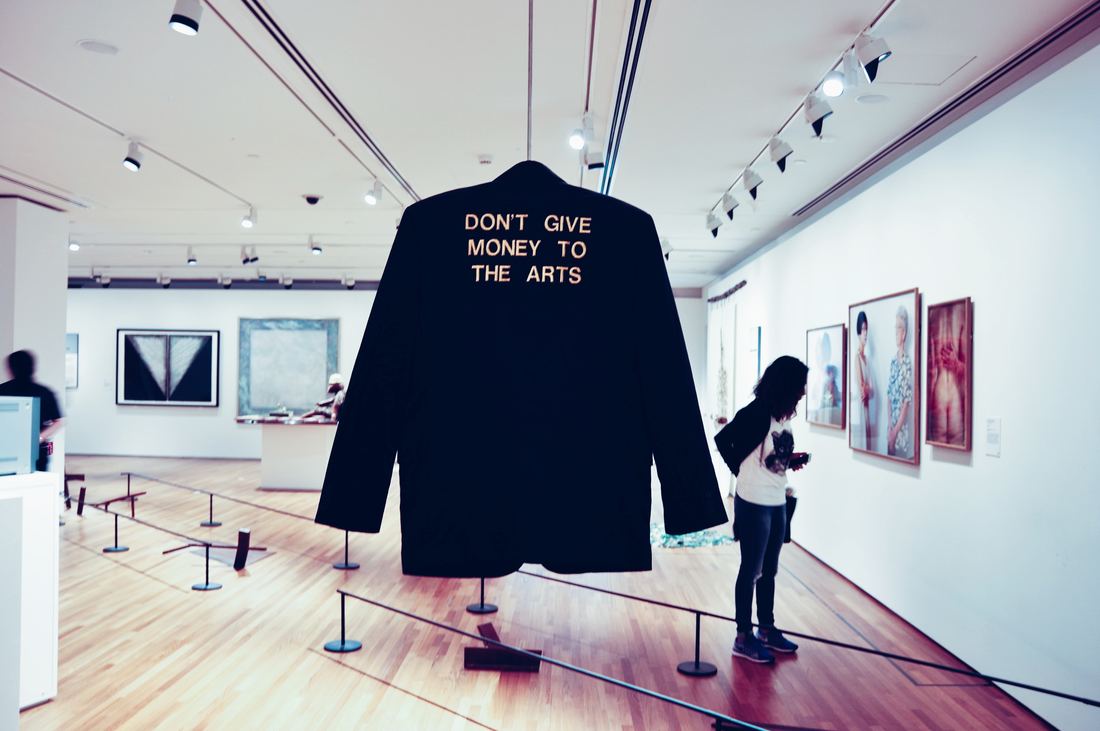
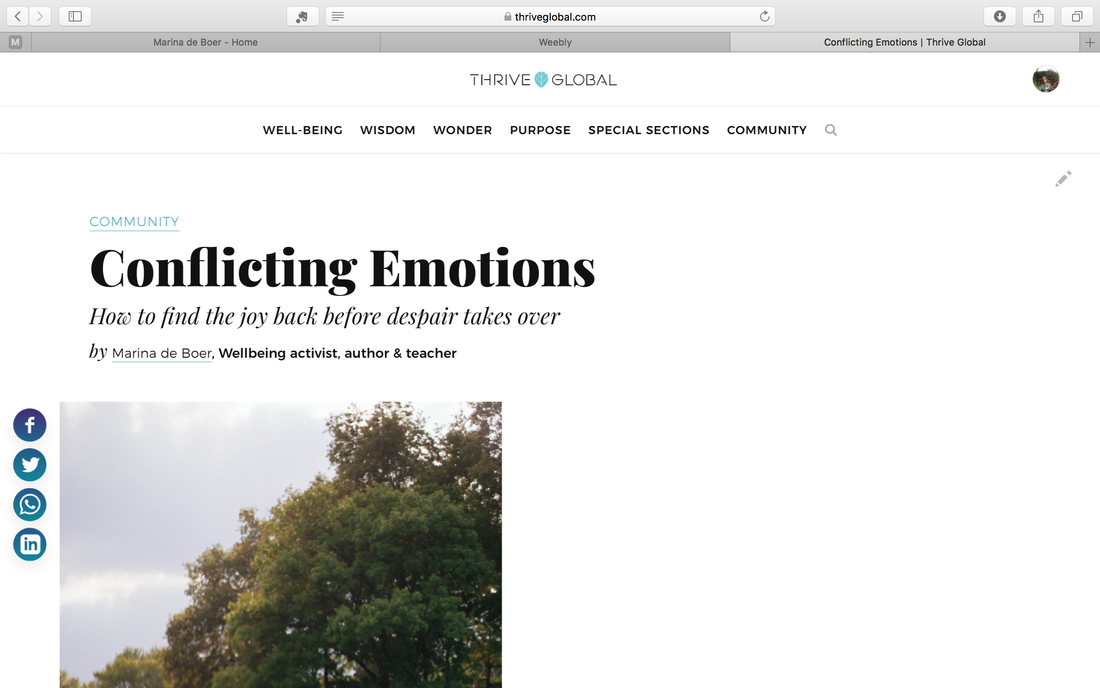
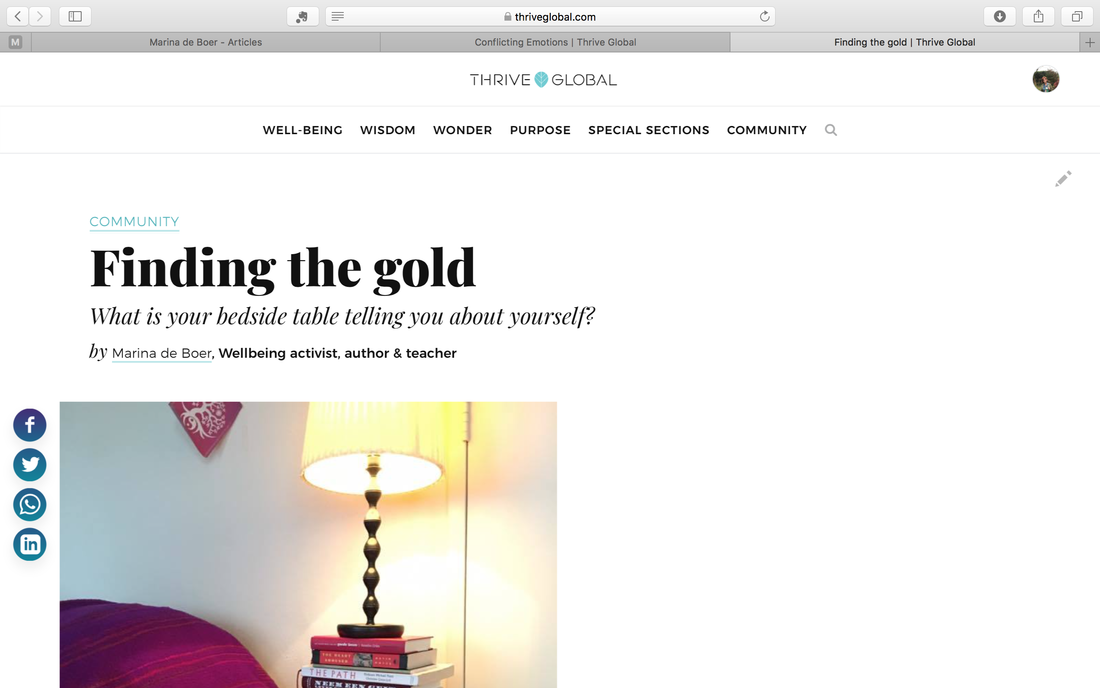
 RSS Feed
RSS Feed
